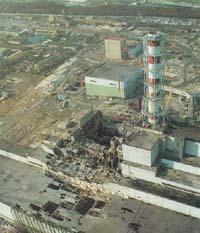If the man disappeared...

Holmes tries to discover how the Earth would be without human beings.
At the beginning of the article, Holmes recalls that the human being is the most widespread species in the whole planet. That is, we are the most invasive species and, in addition, we generate important consequences in all the places we occupy. Human activity has caused deforestation, the extension of deserts, the depletion of aquifers, the loss of wild species... In addition, the human being has produced chemical and nuclear pollution, and seems to have also provoked climate change.
For all this, Holmes believes that the disappearance of man would be good news for other living beings. Nature would once again take its place and, perhaps after a time, there would be no trace of human activity. O... Perhaps the footprint left by man would not be so easily removed? Holmes tries to clarify this.
Lack of maintenance
Holmes affirms that the lack of electricity would be the first consequence of the disappearance of the human being, which would be perfectly seen from space. Precisely, analyzing the images that are extracted from space during the night is a way of detecting where the human population is concentrated, since artificial lights clearly denounce where the cities and towns are located.
At 24-48 hours after the disappearance of the human being, in that luminous map would begin to appear lagoons, since the power stations would be without fuel. The use of renewable energies (wind turbines, solar panels, etc.) It would have a longer duration, but the lack of maintenance of the distribution network would lead to its extinction in weeks or months. Of course, with it all the electric machinery would be silenced.

The surroundings of Txernobil are recovering faster than people thought. (Photo: Wikipedia)
Buildings, bridges, and other structures could fall due to lack of maintenance. However, its residues would remain long. Notice, the buildings of the civilizations of 3,000 years ago still remain.
But, in no case, in nuclear power plants it would be serious that there would be no maintenance. The reactions that occur in the plants release an extreme heat, so the reactors must be cooled with water. However, as the water evaporates and runs out, the reactors would melt and release a great radiation.
However, the effect of nuclear radiation does not last as long as most people believe. The environment of Txernobil demonstrates the enormous capacity of nature to recover. A few years after people left the area, rats and mice took over the area, attracting wild dogs. Later the autochthonous fauna began to appear. Nowadays, wild boars are ten times more abundant than outside the evacuation area, and large predators, such as the wolf, are also growing a lot.
Capacity for innovation
Something similar can happen in other places. Faster or slower renewal depends on factors such as climate (temperate and humid, rather than cold and arid), degradation of the original ecosystem. And, in some cases, it will not be possible to return to balance before the human being changes.
In fact, in the areas where man has replaced some species with others, a different balance has been achieved, and the existing species have no place. The heirs of domesticated plants and animals, for their part, would enter wild ecosystems, as the pigs and wild horses have done today in different places.

And what would happen to genetically modified plants? According to the author, it is very likely that he will not remain in a world without human beings. Most transgenic plants are transformed to be resistant to pesticides, which means an expenditure on metabolism. Therefore, without pesticides, transgenic plants would be at a disadvantage.
Both pesticides and other chemicals would disappear from the environment, but there is a big difference in time that takes to disappear or completely neutralize. On the other hand, carbon dioxide and methane, both responsible for global warming, which are emitted into the atmosphere, would take a long time to reduce to concentrations that would not affect the climate. In the sea, on the contrary, before in the atmosphere would be observed the cessation of human activity, which would be recovered within a period of time.
Therefore, taking into account all the factors, if within one hundred thousand years the aliens came to Earth, they would not see evident indications of human activity. However, if they began to investigate, they would find indications that the change in the fossil record was evident, that in the cemeteries they would find human skeletons, that in the sediments they would find products created by human activity... And still the radio waves would continue traveling through space. But the Earth would already forget us. That is the conclusion of Holmes. It would be nice to see if it is true!
Published in Gara.
Buletina
Bidali zure helbide elektronikoa eta jaso asteroko buletina zure sarrera-ontzian











